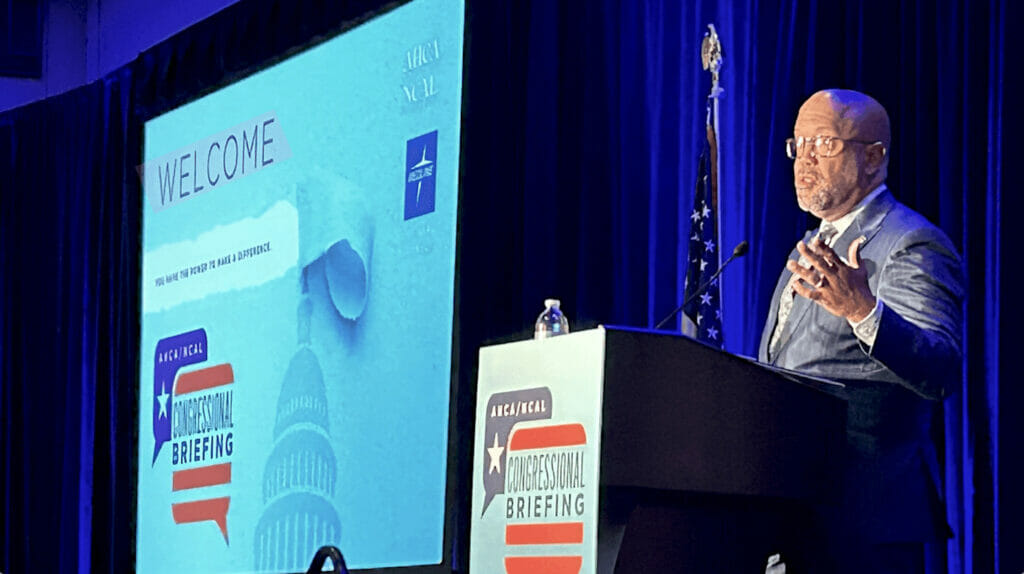
WASHINGTON, DC — Lobbying federal decision-makers for legislation that would benefit the assisted living sector may come with some risk of increased federal scrutiny, American Health Care Association / National Center for Assisted Living Senior Vice President of Government Relations Clif Porter II said Tuesday at the AHCA/NCAL Congressional Briefing.
“But believe you me, it is nothing like what we deal with in the [skilled nursing facility] space,” he added.
Porter was responding to an attendee’s concern related to the Expanding Veterans’ Options for Long-Term Care Act (S. 495/H.R. 1815), which would create a three-year pilot program to offer participating veterans the opportunity to have their care needs met in an assisted living community rather than at a Department of Veterans Affairs home. AHCA/NCAL and members are advocating for the legislation’s passage.
“The good news is that the regulatory impact would likely be veterans-focused,” he said of the bill.
The SVP said that assisted living providers would “have to be careful with these contracts” but noted that providers wouldn’t be mandated to participate in the program for veterans if the bill becomes law. “You can make that decision as an operator if it fits your business model,” he told attendees.
Porter said it’s natural that providers would have worries about the prospect of more federal regulation of the sector.
“There’s always tension. …And when you’re asking for support — and we saw a lot of that during COVID in particular — you sort of run the risk of the government saying, ‘Well, I gave you money so I have the right to oversee and regulate what you do,’ ” he said.
But strengthening relationships with federal lawmakers and officials “actually does the opposite” of raising the risk of oversight at the national level, NCAL Executive Director LaShuan Bethea told McKnight’s Senior Living in an exclusive interview before the Congressional Briefing.
“I think that those relationships actually help us to be able to share with them all of the information that we have about how assisted living is being managed at the state level,” she said.
When questions arise about how assisted living operators handle infection control, emergency preparedness and other issues, Bethea added, NCAL can point officials to the association’s summary of state regulations. “But we’re also able to bring members to the table to provide more detail,” she said.
NCAL and providers came to that figurative table frequently during the height of the pandemic, and continue to do so, Bethea said.
“There are a lot of members of Congress where we had regular communications through our government affairs team, answering questions specifically about assisted living, because many may not have recognized the distinction between skilled nursing and assisted living,” she said. “It created a perfect opportunity for not only myself and members of our team, but also for us to bring providers to the table to talk about some of the challenges or some of the things that they are doing to help the residents during the pandemic. …I think that we’ve had a lot more of those communications over the last several years.”
One result of those discussions, Bethea said, is that federal decision-makers now have a better understanding of assisted living. But clarity also is increasing at the state level and among prospective residents and their families, she added.
The pandemic, Bethea said, has “raised the awareness around people [as far as] what is assisted living, what services can and can’t be provided in assisted living and how it varies from state to state.”
And that variation is a good thing, she added. “States and the people that live in those states are unique, and I think that one of the benefits of assisted living is that we have the ability to provide a variety of models of care that allow us to meet the needs of the people who live in the various larger communities in which an assisted living may be,” she said.
The needs that may be addressed in assisted living are evolving as older adults and their families “are becoming more vocal in their desire to want to stay in a setting if the care can be provided there safely or if there’s a limitation that can be changed,” Bethea said.
An example, she said, is the expansion of medication administration in assisted living. In some places, certified medication aides are able to administer medications.
“It has always existed in some states, but we’re seeing other states looking at that as a way to allow an individual who otherwise would be appropriate for assisted living but needs more assistance with their medication to be able to stay in assisted living longer, because that’s their primary need,” Bethea said.
But even as assisted living evolves and serves people with greater health needs, she shared a prediction about the future of the industry with McKnight’s Senior Living: “I don’t know that there’s going to be a drastic change. I think assisted living is a key component of the continuum, and I don’t think assisted living will turn into skilled nursing. There is a line in the sand. …I think that it will continue to serve that population of individuals that do not require 24-hour skilled nursing care.”
Right now, though, in addition to the Expanding Veterans’ Options for Long-Term Care Act, NCAL continues to focus advocacy efforts on trying to ensure sufficient workforce members to provide the care and services that are offered in the sector.
“While overall staffing levels are beginning to increase, it still remains a challenge for many assisted living providers,” Bethea noted at the Congressional Briefing, adding that, “The [idea] that assisted living is fully back to normal is just not accurate.”
For that reason, she told attendees, NCAL is supporting legislation to help retain temporary nurse aides as well as immigration policies that would help address the labor crisis.





